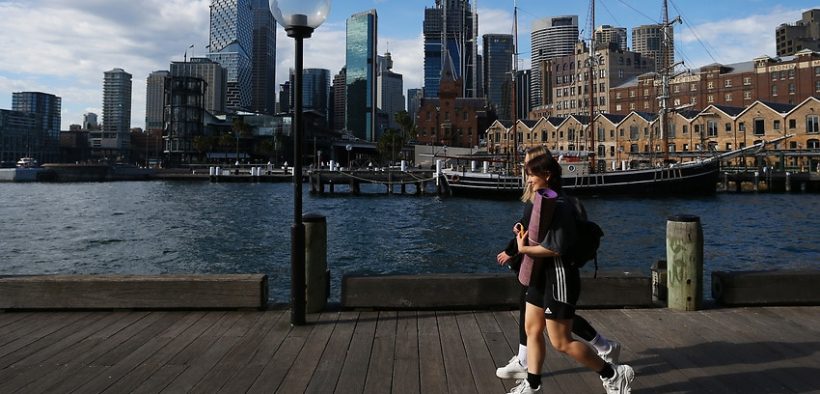NSW sets new national daily COVID-19 case record with 3,057 infections

People jogs along the Circular Quay boardwalk on October 19, 2021 in Sydney, Australia. Source: Getty Images AsiaPac
NSW has broken another national record after more than 3,000 people were diagnosed with COVID-19 in a single day.
There were 3,057 cases recorded in the 24 hours until 8pm on Monday from 136,972 tests.
That’s 556 more than the previous day’s 2,501 cases.
There are 284 COVID-19 patients in hospital – up from 261 – and 39 people are in ICU – up from 33 and 11 are ventilated.
Two people died from the virus including a vaccinated man in his 80s from Sydney’s south who had underlying health conditions.
An unvaccinated woman in her 70s from the Central West with underlying health conditions died at the Gosling Creek Aged Care facility.
Newcastle remains the epicentre of the Omicron outbreak, with 5,169 active cases now in the Hunter region, and 820 new cases.
With just days until Christmas, COVID-19 testing sites are overwhelmed with people anxious to get the all-clear to be able to safely attend yuletide celebrations.
Premier Dominic Perrottet is resisting widespread calls to revert to mask mandates indoors but national cabinet is meeting on Wednesday to discuss the latest COVID-19 crisis, amid speculation masks rules will be reimposed and booster shots expedited.
Meanwhile, NSW Opposition Leader Chris Minns is isolating at home after one of his staffers contracted the virus.
He criticised Mr Perrottet’s refusal to heed the calls from experts and reintroduce mask mandates indoors.
He says it is putting everyone’s Christmas celebrations in jeopardy.
“The main thing here is that Christmas isn’t ruined and we don’t go back into lockdown,” he told Sydney radio 2GB.
“We’ve gotten used to wearing masks, there’s strong evidence they work – preventing the disease from spreading more than it otherwise would.
The Royal Australian College of Physicians is the latest medical body urging the reintroduction of COVID-19 restrictions to stop the spread of the Omicron variant.
RACP president John Wilson says he is wary of the increasing COVID-19 case numbers in NSW.
“If not checked a surge in cases will further burden our already exhausted health systems due to an overwhelming rise in hospitalisations.
“The relaxation of restrictions in some jurisdictions, especially those associated with mask-wearing, QR code check-ins and large gatherings, can have dire consequences,” he said.
The NSW vaccination rate remains the same with 94.9 per cent of people aged 16 and older having had one dose, while 93.4 per cent of people are fully jabbed.
Some 81.4 per cent of people aged 12-15 have had one dose of a vaccine and 78.1 per cent have had both doses.
From Tuesday fully vaccinated overseas travellers entering NSW will no longer have to isolate for 72 hours.
Overseas arrivals to Sydney will have to get a COVID-19 PCR test within 24 hours and isolate at home until they return a negative result.
COVID-19 cases grow in Victoria
Victoria reported 1,245 new COVID-19 cases and six deaths on Tuesday, as testing sites continue to be inundated in the lead up to Christmas.
Testers processed 66,888 results in the 24 hours to Tuesday morning, while 14,483 people were vaccinated in state-run hubs.
At least 15 testing sites were temporarily closed at 9am after reaching capacity, including the Bourke Street walk-in and Albert Park drive-through.
On Monday night, Melbourne Lord Mayor Sally Capp announced a testing site would open at Town Hall from 10am on Tuesday to January 24 in response to demand.
Mr Merlino said the state had also recently added sites in Dandenong, Berwick and Frankston, and extended opening hours after anticipating increased demand.
“I know there have been some sites where the queues are very long. I am asking for people’s patience – I know this has been a very difficult time and it’s quite an inconvenience,” he said.
“But for the most part, across all of our 260 sites, we’re getting through (tests) in 40 minutes on average, and we have expanded sites where we’ve got particular gaps in the southeast.”
The surging demand, he said, has been fuelled by Victorians needing a negative test result to travel interstate to reunite with friends and family over Christmas.











